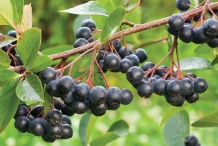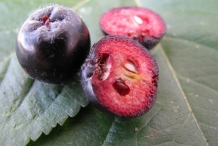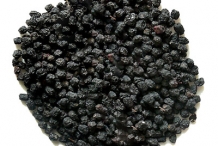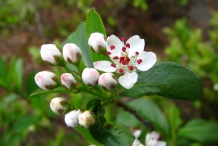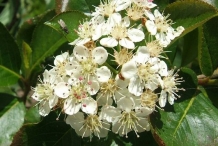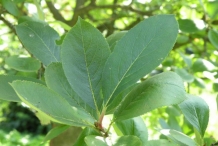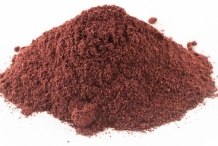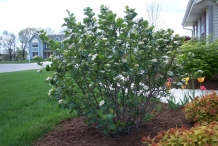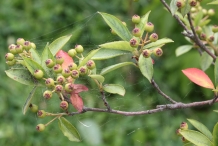Plant
Chokeberry plant is a woody shrub growing to 4-8 feet tall. The glossy leaves are alternate, elliptic-obovate, dark green; 1-3 inches long and ¾-2 inches wide. The flower occurs from July to August. The hermaphrodite flowers are showy, white which have five petals. The fruits are about 1/3-1/2 inch in diameter of pea sized. Each fruit possess one to five small seeds of deep purple. The fruit have dry, sour and sharp flavor with distinctive taste. The fruiting season begins from Late August to Mid-September. The tree of Chokeberry has perennial lifecycle which has the lifespan of 40-60 years in wild. Thirty berries are contained in a bunch.
History
Choke berry (Aronia Berry) berries are originated from East Canada and Eastern parts of North America. Around 1900, it was migrated to Europe and Germany to Russia. In the recent days, it is cultivated in Germany and East European countries.
Nutritional value
100 grams of Chokeberries grants 26.26% of manganese, 23.33% of vitamin C, 13.95% of total dietary fiber, 7.80% of Vitamin E, 7.75% of Iron, 7.38% of carbohydrate, 6.25% of vitamin B9, 4.82% of zinc, 4.76% of magnesium, 3.45% of potassium, 3% of calcium, 2.80% of protein, 1.43% of total fat and 0.07% of sodium.
Health Benefits of Chokeberries (Aronia Berry)
The research shows Chokeberries are rich in antioxidants which prevents cells from the oxidation of free radicals. In 100 g of Chokeberries, about 1480 mg of anthocyanin is found and 1752 mg of polyphenol. Anthocyanin provides dark purple color to the berry. The research made on the anthocyanin on Chokeberries shows that in 100 foods only 24 included it. The research also shows that Chokeberries have the ability to prevent cardiovascular diseases, cancer, ulcers, diabetes, eye inflammation, joint pain, liver disease, flu, cold and allergies. It promotes the memory, slows down the ageing process and enhances the wellbeing.
These berries enhance the circulation of blood, enhance the blood vessels and restrain virus. The berry holds anti-inflammatory, antioxidant and anti-carcinogenic properties which help to maintain overall health. It also prevents the formation of cardiovascular ailments as well as cancer. It has tart or bitter taste similar to blueberry.
- Help Lose weight
Chokeberries (Aronia Berry) have low amount of fat and calories along with dietary fiber and nutrients. These berries help to remain healthy without having extra pounds.
- Assist digestion
Chokeberries is rich in dietary fiber which assists in digestion by passing the food easily through gut. Fiber helps to add bulk to the stool and eliminates diarrhea, constipation, bloating, cramping and stomach discomfort. These berries prevent the harmful bacteria in the gut due to the presence of antioxidant and immune enhancing properties. (1)
- Loads with Antioxidant properties
There are various antioxidant properties packed in this berries. It possesses caffeic acid, quercetin, malvidin, epicatechin, carotene and zea-xanthin. The presence of antioxidant properties enhances the overall health by eradicating free radicals from eyes, skin, bloodstream, tissues and organs. The free radicals lead to the mutation of healthy cells. It is packed with impressive flavonoid and anthocyanin properties. (2)
- Prevents cancer
The research shows that the presence of anthocyanin in Chokeberries helps to lower the chances of colon cancer. The berries have the ability to prevent various forms of cancer. (3)
- Cognitive ailments
Free radicals damage the pathways of cognitive and brain. The presence of anthocyanins in Chokeberries are associated with the raise of activities of neural pathways and also lower oxidative stress in brain. It lowers the chances of dementia, Alzheimer’s and cognitive ailments. (4)
- Immunity
Chokeberries are loaded with antioxidants due to the presence of adequate amount of Vitamin C which helps to regulate the activities of white blood cells. WBC is vital for the collagen production. Collagen is essential for the repair and growth of new organs, tissues, cells and blood vessels. (5)
- Eye ailments
Chokeberries contain carotenes which help to lower oxidative stress in eye. It also prevents the chances of macular degeneration and prevents the cataract development. Carotene is an antioxidant which is found in meaningful amount in Aronia berry.
- Skin ailments
Chokeberries enhance the skin health as well as appearance. Due to the presence of oxidative stress, the skin ages such as age spots, wrinkles and appearance of scars and blemishes. Antioxidants found in Aronia berries prevent the age symptoms. It helps to tighten the skin. (6)
- Heart health and blood pressure
Chokeberries are high in potassium which is healthy for the heart. Potassium acts as a vasodilator that provides relief from the stress on cardiovascular system. It helps to relax arteries, blood vessels, drops of blood pressure, increase in blood flow and reduce the risk of stroke and heart attack. Antioxidants and dietary fiber is essential to lower the level of cholesterol and eliminates free radicals. (7)
- Antibacterial properties
The research shows that Chokeberries have a direct effect on gut infections, common flu and respiratory tract infections. (8)
- Prevents diabetes
Dietary fiber found in Chokeberries are associated to raise in the regulation of insulin that helps to normalize the level of blood sugar, prevents drops and spikes which could be harmful for the diabetic patients. These berries help to prevent diseases. (9)
https://www.youtube.com/watch?v=Bhwr5_O9UlY
Types of Aronia Berry
There are various types of Aronia berry such as:
1. Aronia red:
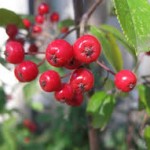 It reaches up to a height of 2 to 4 m which rarely reaches to 6 m. Foliage is about 5 to 8 cm broad. The flowers are white to pale pink and measures 1 cm broad. Fruits are 4-10 mm wide and red.
It reaches up to a height of 2 to 4 m which rarely reaches to 6 m. Foliage is about 5 to 8 cm broad. The flowers are white to pale pink and measures 1 cm broad. Fruits are 4-10 mm wide and red.
2. Aronia black:
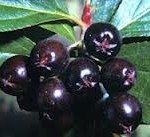 It reaches up to the height of 1-3 m. The foliage is small and has the width of 6 cm. The flower is white and fruits are black of about 6-9 mm wide.
It reaches up to the height of 1-3 m. The foliage is small and has the width of 6 cm. The flower is white and fruits are black of about 6-9 mm wide.
3. Aronia violet (purple):
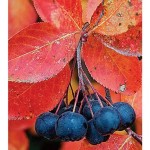 It is the mixture of above two kinds of Aronia berry. Fruits are about 7-10 mm wide and is dark purple to black.
It is the mixture of above two kinds of Aronia berry. Fruits are about 7-10 mm wide and is dark purple to black.
3 Ways to Add Chokeberries to Your Diet
a) Eat Them Straight
The intake of 100 gm of berries provides about 35% of Vitamin C. It is consumed with oatmeal, yogurt, baked goodies and smoothies.
b) Drink Aronia Juice
A glass of Chokeberrie juice provides 21.7 g of total carbohydrates, 25 mg of sodium, 250 mg of potassium and 33.3 mg of calcium.
c) Take Aronia Supplements
Chokeberries could be included in the meals by taking natural supplements of Aronia. The supplements benefits the various components such as probiotics.
Traditional uses
- Chokeberries assist in the circulation of blood supply to the essential organs and tissues.
- It helps to purify blood, lower blood sugar levels, blood pressure.
- It helps to deal with vein inflammation and atherosclerosis.
- It helps to promote the function of endocrine glands and regulates the hormone secretion.
- It assists in the digestion of food.
- Chokeberries helps to lower stomach pain, inflammation and also treats gastritis and stomach ulcer.
- It enhances the liver function, bile secretion and eliminates toxins from liver.
- It is an aid for inflammation, liver problems, gallbladder inflammation, jaundice and bile stones.
- The juice and tea made from Aronia berries helps to strengthen immunity and infections.
- It is helpful for anemia as well.
Precautions
- Due to the presence of oxalic acid in Ariona berry, it may crystallize as oxalate stones in urinary tract.
- The people with oxalate urinary tract stones should not consume it in huge amounts.
- Oxalic acid interferes with magnesium and calcium absorption.
- The excessive consumption of Ariona berries results in gastrointestinal discomfort.
- The pregnant and breast feeding women should not consume Ariona berries.
How to Eat
- Ripened fruits are consumed fresh.
- It is used to make jelly and dried to make pemmican.
- The fruits are used for various culinary purposes.
- It is also used to make juice, compote, wine and pickles.
- In Europe, it is used to make alcoholic beverages and also used as a food colorant.
- The berries can be canned, made into candies, jelly, pie, sorbet, yogurt and flavored milk.
- It is also used as tea, food coloring, syrup and coloring for fruit spread.
- In Europe, juice is blended with apple juice to enhance a blush.
- In Russia, apple juices and aronia berries are fermented to make red wine.
- In Lithuania, the juice of Aronia is used to make dessert wines.
- The berries are used as tops for ice cream and fruit salads.
- They are used in cakes, tarts, juice, muffins and pies.
- The dried berries are added to the baby food preparations.
- The berries can added to smoothies.
- The syrup made from Aronia berries are used as an ingredient in many cuisines.
- Dried berries are mixed with muesli.
- Aronia berries are brewed as an herbal tea.
- The berries enhance the flavor of yogurts and fruit drinks.
References:
http://davesgarden.com/guides/pf/go/73560/
https://npgsweb.ars-grin.gov/gringlobal/taxonomydetail.aspx?id=4247
http://www.pfaf.org/user/Plant.aspx?LatinName=Aronia+melanocarpa
http://aroniainamerica.blogspot.com/2011/03/is-it-chokeberry-or-chokecherry.html
http://www.missouribotanicalgarden.org/PlantFinder/PlantFinderDetails.aspx?kempercode=j420
https://extension.umaine.edu/agriculture/home/aronia/plant-description-and-habitat/
http://www.agmrc.org/commodities-products/fruits/aronia-berries/
http://www.healthyfoodstar.com/aronia-health-benefits/
http://www.onlyfoods.net/aronia-berry-chokeberry.html#interesting-facts
http://digitalcommons.unl.edu/cgi/viewcontent.cgi?article=1039&context=extensionhist
http://www.nrcs.usda.gov/Internet/FSE_PLANTMATERIALS/publications/ndpmcrb7936.pdf
http://www.nutrition-and-you.com/chokeberry.html
http://aroniainamerica.blogspot.com/2011/03/how-do-you-use-aronia-berries.html
https://www.organicfacts.net/health-benefits/fruit/chokeberries.html
Comments
| Chokeberries (Aronia Berry) Quick Facts | |
|---|---|
| Name: | Chokeberries (Aronia Berry) |
| Scientific Name: | Aronia melanocarpa |
| Origin | Eastern North America |
| Colors | Black, purple or red, glossy (Fruit) |
| Shapes | Diameter: 1/3-1/2 inch, pea sized (Fruit) |
| Taste | Distinctive |
| Calories | 47 Kcal./cup |
| Major nutrients | Manganese (28.26%) Vitamin C (23.33%) Total dietary Fiber (13.95%) Vitamin E (7.80%) Iron (7.75%) |
| Health benefits | Lose weight, Assist digestion, Antioxidant properties, Prevents cancer, Cognitive ailments |
| More facts about Chokeberries (Aronia Berry) | |
| Rank | Scientific Name & (Common Name) |
|---|---|
| Kingdom | Plantae (Plants) |
| Subkingdom | Tracheobionta (Vascular plants) |
| Infrakingdom | Streptophyta (Land plants) |
| Superdivision | Spermatophyta (Seed plants) |
| Division | Magnoliophyta (Flowering plants) |
| Class | Magnoliopsida (Dicotyledons) |
| Subclass | Rosidae |
| Superorder | Rosanae |
| Order | Rosales |
| Family | Rosaceae (Rose family) |
| Genus | Aronia Medik. |
| Species | Aronia melanocarpa (Michx.) Elliott (Black chokeberry) |
| Synonyms |
|



